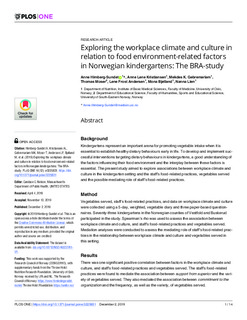| dc.contributor.author | Himberg-Sundet, Anne | |
| dc.contributor.author | Kristiansen, Anne Lene | |
| dc.contributor.author | Gebremariam, Mekdes Kebede | |
| dc.contributor.author | Moser, Thomas | |
| dc.contributor.author | Bjelland, Mona | |
| dc.contributor.author | Andersen, Lene Frost | |
| dc.contributor.author | Lien, Nanna | |
| dc.date.accessioned | 2020-01-31T08:59:07Z | |
| dc.date.available | 2020-01-31T08:59:07Z | |
| dc.date.created | 2020-01-15T23:57:42Z | |
| dc.date.issued | 2019 | |
| dc.identifier.citation | PLOS ONE. 2019, 14 (12). | nb_NO |
| dc.identifier.issn | 1932-6203 | |
| dc.identifier.uri | http://hdl.handle.net/11250/2638986 | |
| dc.description | This is an open access article distributed under the terms of the Creative Commons Attribution License, which permits unrestricted use, distribution, and reproduction in any medium, provided the original author and source are credited. | nb_NO |
| dc.description.abstract | Background
Kindergartens represent an important arena for promoting vegetable intake when it is essential to establish healthy dietary behaviours early in life. To develop and implement successful interventions targeting dietary behaviours in kindergartens, a good understanding of the factors influencing their food environment and the interplay between these factors is essential. The present study aimed to explore associations between workplace climate and culture in the kindergarten setting and the staff’s food-related practices, vegetables served and the possible mediating role of staff’s food-related practices.
Method
Vegetables served, staff’s food-related practices, and data on workplace climate and culture were collected using a 5-day, weighted, vegetable diary and three paper-based questionnaires. Seventy-three kindergartens in the Norwegian counties of Vestfold and Buskerud participated in the study. Spearman’s rho was used to assess the association between workplace climate and culture, and staff’s food-related practices and vegetables served. Mediation analyses were conducted to assess the mediating role of staff’s food-related practices in the relationship between workplace climate and culture and vegetables served in this setting.
Results
There was one significant positive correlation between factors in the workplace climate and culture, and staff’s food-related practices and vegetables served. The staff’s food-related practices were found to mediate the association between support from superior and the variety of vegetables served. They also mediated the association between commitment to the organization and the frequency, as well as the variety, of vegetables served.
Conclusion
The results identified commitment to the organization and support from superior as two important factors in the workplace climate and culture. Furthermore, these two factors seems to be important to target when developing kindergarten-based interventions aimed at increasing the variety and frequency of vegetables served as they were associated with more favourable food-related practices among staff. | nb_NO |
| dc.language.iso | eng | nb_NO |
| dc.rights | Navngivelse 4.0 Internasjonal | * |
| dc.rights.uri | http://creativecommons.org/licenses/by/4.0/deed.no | * |
| dc.title | Exploring workplace climate and culture in relation to food environment related factors in Norwegian kindergartens. The BRA-Study | nb_NO |
| dc.type | Journal article | nb_NO |
| dc.type | Peer reviewed | nb_NO |
| dc.description.version | publishedVersion | nb_NO |
| dc.rights.holder | © 2019 Himberg-Sundet et al. | nb_NO |
| dc.source.pagenumber | 14 | nb_NO |
| dc.source.volume | 14 | nb_NO |
| dc.source.journal | PLOS ONE | nb_NO |
| dc.source.issue | 12 | nb_NO |
| dc.identifier.doi | 10.1371/journal.pone.0225831 | |
| dc.identifier.cristin | 1774300 | |
| cristin.unitcode | 222,59,7,0 | |
| cristin.unitname | Institutt for pedagogikk | |
| cristin.ispublished | true | |
| cristin.fulltext | postprint | |
| cristin.qualitycode | 1 | |

